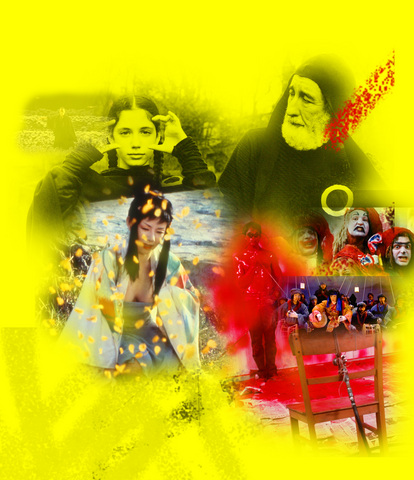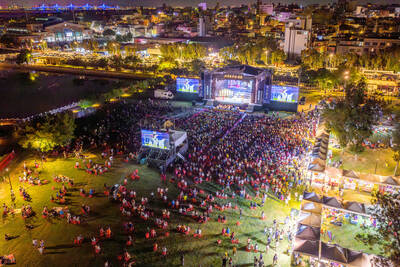What happened when theater master Samuel Beckett met American maestro of comedy Buster Keaton in a 1965 silent short entitled Film? How deep into the mysterious abyss of desire did the great German choreographer and dancer Pino Bausch plunge in her first and only cinematic work to date called The Complaint of an Empress? The touring film festival Through a Glass Darkly, organized by the Taiwan Film and Culture Association (台灣電影文化協會), consists of 22 hard-to-find movies made by, or featuring, international heavyweight theater directors, and is set to open up a mind-blowing vista on the hybrid wonderland of cinema and theater starting today at Spot.
In classical theater, the script is definitive, and members of the audience are treated as readers who comprehend the narrative through the actorss' speech. The film festival's organizers have not positioned Through a Glass Darkly within this paradigm. Rather, the films to be screened sneer at the faithful representation of the script and use cinematic elements of imagery, light, shadows, sounds, voices and fragmented narratives to represent the meaining of a text.
“The theater directors we selected were all deemed heretical by the orthodox theater circle since they crossed over freely to different media, bringing elements from the visual arts and cinema to the art of theater and enriching the cinematic form with theatrical aesthetics,” said the festival's curator Wang Pai-chang (王派章).

PHOTO COURTESY OF SPOT
The Great unknowns
Though the names of Jan Fabre, Ariane Mnouchkine or Christoph Martler may sound foreign to local theater-goers, all the subjects introduced in the festival are influential figures in contemporary theater scene, said Wang, who laments the dearth of world-class performances by international masters in Taiwan.
Belgian artist Jan Fabre is almost unknown in Taiwan. A controversial performing artist, choreographer and visual artist, Fabre is famous for employing nudity, self-mutilation, blood, urine and semen in his works that challenge bourgeoisie morality. His film Les Guerriers de la Beaute, is a phantasmagoria of elements taken from his art works.
Composer, theater director and filmmaker Meredith Monk is a versatile artist who produces multi-disciplinary works. The festival will screen her first feature film Book of Days , a work that presents poetic imagery of the Middle Ages alongside images of contemporary religious conflicts, nuclear proliferation and the HIV epidemic. The soundtrack features Meredith Monk and Vocal Ensemble and has become a sought-after edition to contemporary music enthusiasts' collections.
Besides the works in the interdisciplinary category, films made by theater directors dedicated to cross-cultural studies are also on the bill.
Having ventured into different foreign cultures ranging from Chinese, Japanese to Indian and Tibetan, Ariane Mnouchkine, director of the famed French contemporary theater group Theatre du Soleil, is known for her innovative methods of blending Oriental theatrical forms with the Western tradition of realism. A cinematic rendition of the classical play Tambours sur la Digue first stage in 1999, Mnouchkine's film of the same name is a mix of live theater and puppetry inspired by Japanese Noh and Bunraku theater in which female roles are played by masked painted actors manipulated by black-clad handlers.
Theater master Peter Brook from the UK is an enthusiast of Indian culture and prefers to work with actors of different nationalities. In order to make a theatrical adaptation of the Indian epic of 4 million words, The Mahabharata, Brook spent five years studying the epic and traveling to India for inspiration. The end result is a nine-hour long masterpiece that examines the role of myths as a universal aspect of human culture. Local audiences may never get the chance to see the 1985 theatrical classic, but the cinematic version screened at the festival offers a way to visit the ethereal world of the original.
Exploring legends
The festival lineup also includes several rarely seen documentaries on the works of legendary figures in contemporary theater. Einstein on the Beach: The Changing Image of Opera takes a look at the landmark modern opera Einstein on the Beach first staged in 1976, a collaboration between theater director Robert Wilson and composer Philip Glass. Featuring interviews with Wilson and Glass along with clips of performances, the film not only presents an insight into the four-hour long play of mechanical body movements and minimalist sounds, but also the chance to gain insights into the minds of two important figures in American contemporary theater and classical music.
An elusive yet influential performing artist, painter, stage designer and theater director from Poland, Tadeusz Kantor created a unique theatrical world of anti-realism, and his belief that theater is a personal creation aligns his work with the tradition of contemporary fine art. In The Theatre of Tadeusz Kantor, director Denis Bablet interweaves interviews, segments of Kantor's works and rare scenes of the late artist at work to trace Kantor's extraordinary evolution as an artist.
Other recommended works for film buffs include German filmmaker Rainer Werner Fassibinder's Nora Helmer (1973), his only cinematic work shot in theatrical form, a radical yet faithful adaptation of Henrik Ibsen's A Doll House, which will be shown in Taiwan for the first time.
Hailed by French philosopher Gilles Deleuze as “the greatest Irish movie,” Film (1965) is Beckett's only cinematic work and stars the aging Keaton as a neurotic, anxious man.

Last week the Chinese Nationalist Party (KMT) announced that the legislature would again amend the Act Governing the Allocation of Government Revenues and Expenditures (財政收支劃分法) to separate fiscal allocations for the three outlying counties of Penghu, Kinmen and Matsu from the 19 municipalities on Taiwan proper. The revisions to the act to redistribute the national tax revenues were passed in December last year. Prior to the new law, the central government received 75 percent of tax revenues, while the local governments took 25 percent. The revisions gave the central government 60 percent, and boosted the local government share to 40 percent,

Many will be surprised to discover that the electoral voting numbers in recent elections do not entirely line up with what the actual voting results show. Swing voters decide elections, but in recent elections, the results offer a different and surprisingly consistent message. And there is one overarching theme: a very democratic preference for balance. SOME CAVEATS Putting a number on the number of swing voters is surprisingly slippery. Because swing voters favor different parties depending on the type of election, it is hard to separate die-hard voters leaning towards one party or the other. Complicating matters is that some voters are

Sept 22 to Sept 28 Hsu Hsih (許石) never forgot the international student gathering he attended in Japan, where participants were asked to sing a folk song from their homeland. When it came to the Taiwanese students, they looked at each other, unable to recall a single tune. Taiwan doesn’t have folk songs, they said. Their classmates were incredulous: “How can that be? How can a place have no folk songs?” The experience deeply embarrassed Hsu, who was studying music. After returning to Taiwan in 1946, he set out to collect the island’s forgotten tunes, from Hoklo (Taiwanese) epics to operatic

Five years ago, on the verge of the first COVID lockdown, I wrote an article asking what seemed to be an extremely niche question: why do some people invert their controls when playing 3D games? A majority of players push down on the controller to make their onscreen character look down, and up to make them look up. But there is a sizable minority who do the opposite, controlling their avatars like a pilot controls a plane, pulling back to go up. For most modern games, this requires going into the settings and reconfiguring the default controls. Why do they